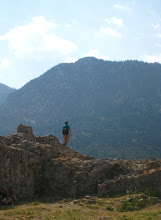George Phrantzes was a Byzantine historian during its final years who has left a brief, short chronicle detailing its final years. As the protovestarios, a high Byzantine court official, he lived through its most tragic events including the fall of Constantinople in 1453 and the aftermath of its fall. His chronicle, however, is very brief and almost laconic in its entries which are concerned with the events in the best sense of a chronicle and not the analysis that comes with the typical Byzantine history. It consequently has few literary pretentions like the histories of his contemporaries Laonicus Chalcocondylas and Michael Critobulus who write in a purist form of Attic Greek in comparison with Phrantzes' plain chronicle style. I, personally, however, find it interesting to analyze his introduction, which has been translated below.
THE WRETCHED GEORGE PHRANTZES, PROTOVESTARIOS, THEN GREGORY A MONK, THIS WE WROTE OF THE THINGS THAT HAPPENED TO US AND ALSO A FEW THINGS THAT HAPPENED IN THE COURSE OF OUR OWN ABJECT LIFE
It would have been good for me had I not been born or died as a child. Since this did not happen, let it be known that I was born on Tuesday, August 30, in the year 6909 (1401 A.D.) and reborn through the most holy Saint Thomais, about whom we shall narrate truthfully at the appropriate point.
Saint Thomais mentioned above is not to be confused with St. Thomais of Alexandria or another Byzantine saint of that name from Lesbos whose biography is translated in Holy Women in Byzantium by Paul Halsall online at http://www.doaks.org/publications/doaks_online_publications/HolyWomen/talbch9.pdf, but the saintly woman Phrantzes knew throughout his life as detailed in Chapter 18.
What is interesting is the melancholy that our former Byzantine officer expresses. It is interesting to note that Phrantzes alludes to Matthew 26. 24, "Woe on that person, by whom the son of God is betrayed, it would have been good for him if that man had not been born." It seems as though Phrantzes implies he is Judas who betrayed Jesus Christ. I think it is a beautiful way of expressing his regrets over his sins and wish that he had died, perhaps, at the fall of Constantinople.
Saturday, October 18, 2008
Subscribe to:
Post Comments (Atom)

No comments:
Post a Comment